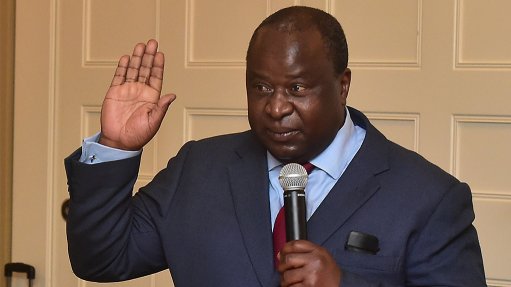
Finance Minister Tito Mboweni
Minister Tito Mboweni’s medium-term budget speech has once again failed to provide the fiscal leadership needed in our country, falling far short of making the tough decisions necessary to cut government’s wasteful expenditure and reduce debt.
The Minister’s focus on preventing the country entering a debt trap, peaking at 95% by 2025, was well received. However, by his own admission, these plans are based upon President’s Ramaphosa’s economic recovery plan generating more employment and more taxes.
Despite the Minister describing the President’s job creation initiatives as ‘game-changing’, the truth is that the 2.2 million real jobs lost in 2020 so far, are to be replaced by temporary work opportunities. These EPWP-type, minimum wage opportunities are not real jobs, do not generate real taxes, and are unlikely to result in increased government revenue to reduce South Africa’s debt ratios.
Mboweni made no mention of the stalled talks with the IMF to borrow $1 billion, arising from the IMF’s insistence that such funding could not be used to fund ailing State-Owned Entities. Mboweni remained silent on what conditions are being placed on foreign borrowings and what, if anything, our government is doing to meet these requirements.
Once again Mboweni has delivered a budget speech which has failed to address the question of how government is reducing its own levels of expenditure. Mboweni has indicated that South Africa is borrowing R1 billion per day and while no clear measures to reduce non-essential expenditure were tabled, the Minister has indicated that a tax increase will come in 2021.
The Minister announced that SAA will receive over R10 billion and no effort to cut the bloated cabinet of the President as a gesture of a commitment to reducing our foreign debt. On the public sector wage bill, all the Minister could speak to was the need for a conversation which may lead to a reduction in reductions.
Instead of getting tough on government waste, the Minister has once again resorted to increase the burden on tax payers.
The budget policy statement was an opportunity to announce a major investment in local government which is failing across the length and breadth of South Africa. While National and Provincial Governments receive R736 billion and R645 billion respectively, Local Government will receive R138 billion. Our cities and towns are meant to be the coalface of service delivery for our roads, water, electricity and housing, and yet local government continues to receive was is left over from National and Provincial levels of our government.
While Minister Mboweni stood and spoke confidently of how the R500 billion Covid-19 response funding was spent, it was reported that the Auditor General and SIU have found that UIF was illegally claimed from 6000 government officials, soldiers, prisoners and even deceased people.
Perhaps the most telling point was the Minister comparison to our financial and economic situation to that which was inherited by President Mandela in 1994. This admission by the Minister tells South Africans what we all know; the ANC has not progressed our country in any meaningful way before it faced the economic fallout of Covid-19.
ActionSA would take bold leadership to our national fiscus to achieve what must be done to start a real recovery in South Africa. This involves:
- Cutting the costs of the civil service by streamlining government, ending cadre deployment and focussing capacity where it delivers a public service.
- Reducing the size of the cabinet from 74 to 25, saving billions in political staffing costs, VIP protection and ministerial homes and travel.
- Ending the era of SAA as a financial drain on our national budget.
- Cutting expenditure on all non-essential government projects, and focussing on projects aligned to meeting key service delivery priorities.
With such savings, South Africa will begin to make positive and immediate changes to our financial position and demonstrate to the world that we are reforming. In time these reforms would lead to taxe reductions to increase household spending in our economy to stimulate economic growth.
The Minister’s budget policy statement is an affirmation to the work of ActionSA to provide the first real alternative to the ANC, because it is apparent that neither the President nor Minister Mboweni will prevent the real plans that are needed to address our real challenges.
Issued by ActionSA